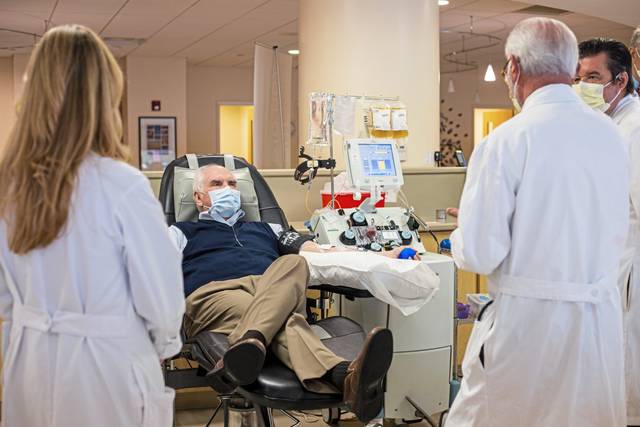Blood donation organizations say they are facing a critical shortage of convalescent plasma from covid-19 survivors – a part of the blood that contains antibodies that can help those still critically ill with the virus overcome the infection.
“I’d say we’re at an emergency level,” said Regina Bratton Boothe, a spokeswoman for the American Red Cross.
Convalescent plasma is plasma – the liquid portion of blood– separated from the other blood components of patients who have had and recovered from covid-19.
When someone is infected with the virus their body creates antibodies, which are in plasma. Giving those antibodies to someone critically ill with covid-19 can give that individual’s body a boost in fighting the virus.
In Pennsylvania, the American Red Cross has collected 1,773 units of convalescent plasma through donations, Bratton Boothe said. Because the pandemic is affecting different states in varying degrees, some local plasma collections must be sent to areas most in need. Of the 1,773 units collected locally, 466 units have gone to neighboring states.
“We’re definitely not collecting at normal rates,” she said. “We’re barely making it.”
Beyond the struggle of bringing in such a stringent subset of donors – those who have verifiably tested positive for the virus and recovered – blood donation organizations are also facing an overall drought in any type of donation.
“We’ve lost hundreds and hundreds of blood drives,” said Kristen Lane, a spokeswoman for Vitalant, formerly the Central Blood Bank. Between school and office closures and social distancing guidelines, traditional blood drives have all but vanished, taking with them a large portion of donations.
Lane said her organization has been experiencing the same shortage. In addition to trying to meet the current need, she said, a projected second wave of the virus later this year means Vitalant is trying to stockpile convalescent plasma, too.
Unlike whole blood and platelets, plasma can be frozen for up to a year.
“None of us has ever seen a situation like this,” Lane said. “We’re doing the best we can with the knowledge that we have.”
While convalescent plasma is still considered an investigative therapy by the Centers for Disease Control and Prevention, early studies from the Mayo Clinic show the plasma, in high doses, can mean fewer deaths among covid-19 patients, according to a report from the Star-Tribune.
The Minnesota newspaper reported this week on a 10 percentage point difference in deaths when comparing hospitalized virus patients who received convalescent plasma with a high number of antibodies compared to those who received plasma with lower concentrations of antibodies.
“I’m just grateful as an American and a doctor that we are seeing some potential benefit, because our patients and our country need some help with covid,” Dr. R. Scott Wright, who is coordinating Mayo’s national covid-19 convalescent plasma program, told the Star Tribune.
Anyone wishing to donate convalescent plasma – or blood, platelets or plasma – should make an appointment with either the Red Cross or Vitalant. Appointments are recommended in order to adhere to social distancing guidelines.
Both organizations have enhanced cleaning procedures to protect donors.








